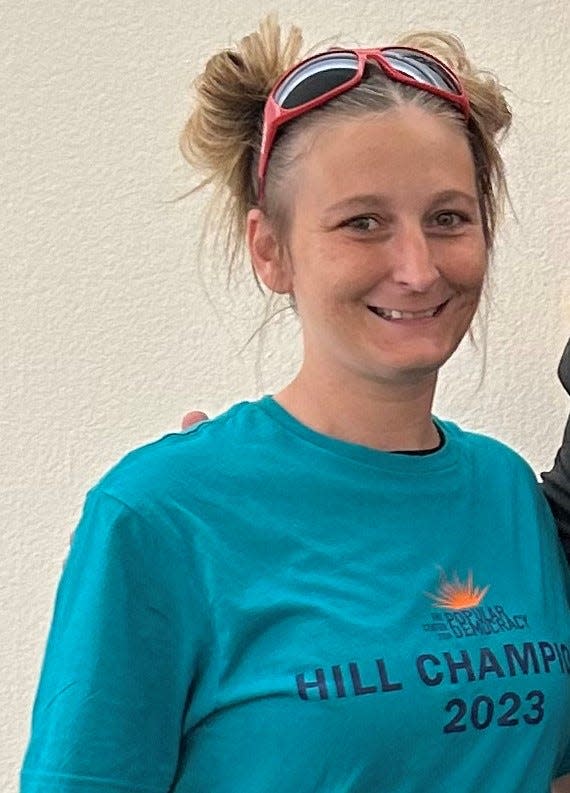J.D. Vance wrote about being poor in Ohio now he's pulling ladder from poor Ohioans
Jeanna Kenney is the advocacy chair member for Building Freedom Ohio, part of Center for Popular Democracy’s affiliate Ohio Organizing Collaborative.
Many Americans are too familiar with the struggle to feed their family —including our U.S. Sen. J.D. Vance — but instead of supporting benefits that families like his relied on, he supports enormous budget cuts to them.
While I’m struggling to pay rent on time and afford groceries, Congress is running out of time to make sure SNAP benefits are covered.
If Congress fails to pass a budget before Friday, January 19, funding for programs, including the Supplemental Nutrition Assistance Program (SNAP), will run out.
From the Archives: It is shameful J.D. Vance spoke at Martin Luther King Jr. breakfast in Columbus
Without SNAP, I face the unfathomable choice between paying rent or making ends meet to feed my children.
The first deadline to pass the federal spending deal is fast approaching.
If lawmakers slash funding or miss the deadline, leading to a partial or full government shutdown, it guarantees that poor communities will be left vulnerable. However, lawmakers can give poor Americans a fighting chance by passing a proposed budget with no federal spending cuts.
More: Here's how SNAP eligibility and benefits are different in 2024
I speak for many.
I speak for the folks I work with as the advocacy chair member for Building Freedom Ohio, I speak for my three children as a mother and their sole caregiver, and I speak for the nation’s 41.2 million SNAP recipients whose livelihoods swing in the balance as lawmakers debate our fate thousands of miles away in Washington.
Over 1.3 million Ohio residents depend on SNAP, and it’s time for Sen. Vance to hear the voices of the Ohioans he swore to represent and protect.
Consider what losing SNAP benefits means for the American people.

Does J.D. Vance remember what it is like to struggle?
Many of us don't have the same fortunes or luxuries that Vance now has. Failing to support and pass the spending bill directly attacks the necessities children and families need to survive. When the pandemic-era SNAP Emergency Allotments ended in March 2023, reducing benefits, there was a 21% rise in food insecurity nationwide.
Does the senator remember the reality of the choices he’s expecting families to make?
Congress’s choices control the severity of my choices for my family.
What will I do if I must decide whether we eat or have a roof over our heads because, like so many, my rent is rising and my wages are not?
Forcing families to choose between food and shelter guarantees hungry, cold children. As much as I can't imagine this happening to my family, it is becoming increasingly inevitable.
SNAP reduces hunger, improves diets, and creates a brighter future. Adults who benefited from SNAP as children show long-term academic success and economic self-sufficiency. So many rely on it to make ends meet, from low-paid working families to older, low-income adults to people with disabilities.
J.D. Vance should not advocate for harmful cuts

Receiving SNAP benefits doesn’t just help recipients’ financial stability – it benefits Ohio’s economic stability. Every $1 from SNAP generates roughly $1.70 in economic activity for Ohio’s economy. SNAP transforms lives and bolsters Ohio's economic resilience and prosperity.
Vance publicly wrote about overcoming the odds and finding success despite growing up poor, and now he is pulling the ladder up behind him.
It’s time he joins Sen. Sherrod Brown, who cares about the Ohioans trying to make ends meet and champion families like mine.
Stop advocating for harmful cuts and support the spending agreement. The time to act is now. Stand with the people of Ohio, safeguard our basic needs, and ensure that the government works for the betterment of all.
Jeanna Kenney is the advocacy chair member for Building Freedom Ohio, part of Center for Popular Democracy’s affiliate Ohio Organizing Collaborative.
This article originally appeared on The Columbus Dispatch: Why is J.D. Vance working against poor people he wrote about in book?
